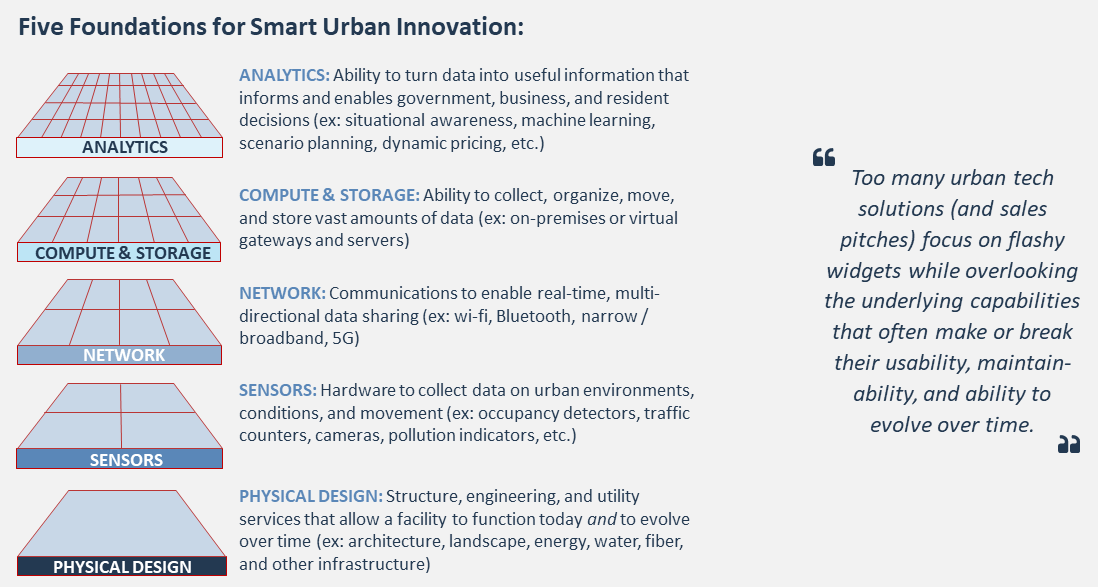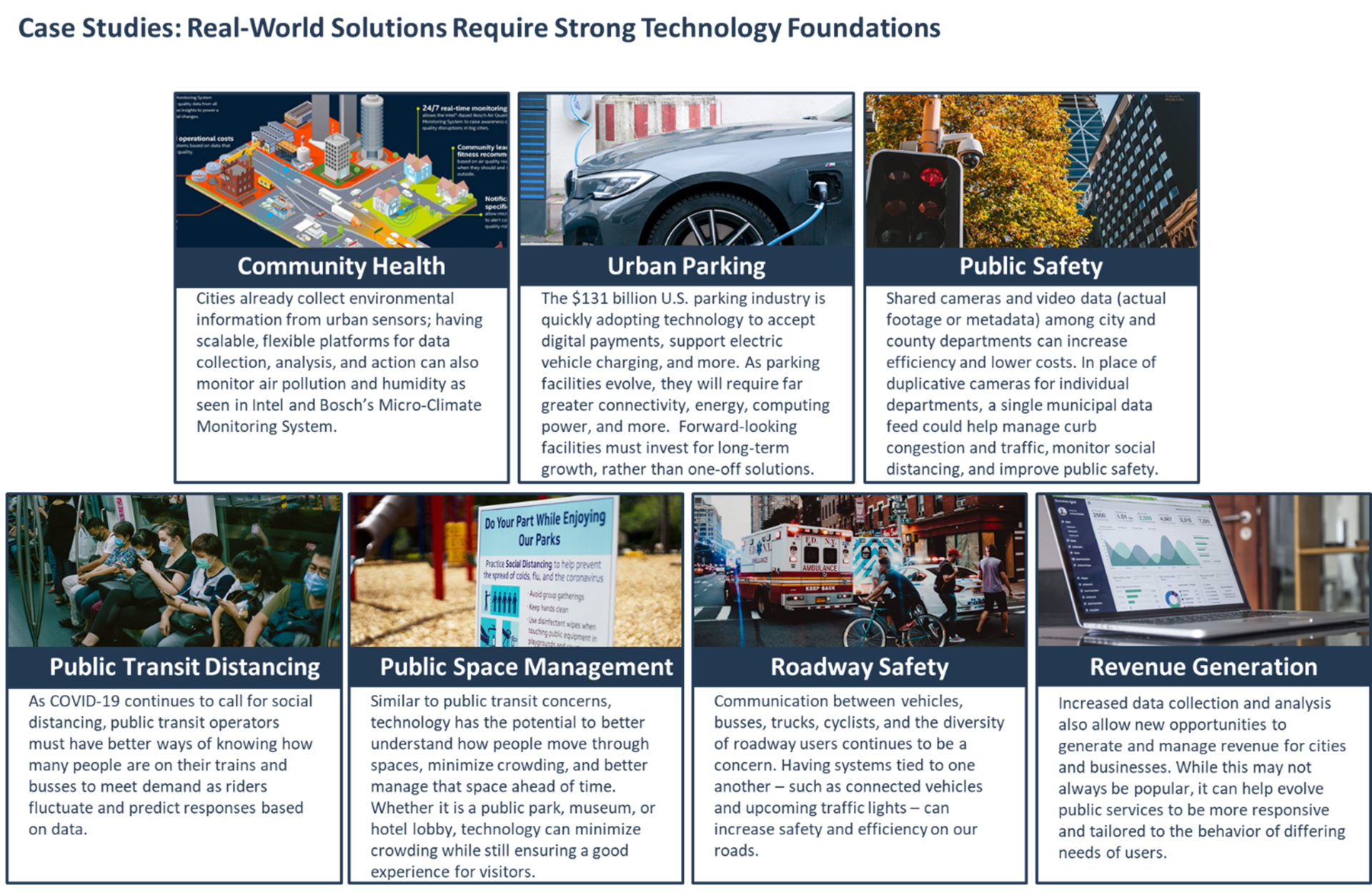“Smart” Isn’t Good Enough: Building a Scalable Tech Foundation for Enduring Urban Solutions
Intel Joins City Tech to Develop Mobility and Connected Infrastructure Solutions
It’s
time to get smarter about smart cities.
Technology
is changing the way we build, manage, and upgrade urban spaces, but too many “smart”
cities look more like a hodgepodge of shiny objects and cool ideas. The promise of better cities through
technology is real, but so is the risk of short-sighted investments that work
in isolation, cannibalize each other’s resources, and inflict death-by-a-thousand-pilots.
Successful
smart city innovators pay as much attention to building scalable technology
foundations
as to specific solutions and applications. Without flexible, forward-looking tech platforms
upon which to build, today’s breakthroughs become tomorrow’s cautionary tales.
This
is why Intel Corporation has joined City Tech Collaborative as a Member and Solution Partner
to co-develop technology-enabled responses to pressing urban problems based on world-class
tech foundations.
Stronger Foundations for Smarter Cities
Any
great chef can name the standard, “go-to” ingredients that lay the foundation
for culinary genius. Proteins, produce,
grains and dairy. Oils, spices, and basic
flavors. But no one creates an
award-winning dish by starting with the garnish and working backwards.
Yet
too many urban tech solutions (and sales pitches) focus on flashy widgets while
overlooking the underlying capabilities that often make-or-break their
usability, maintainability, and ability to evolve over time.
Nearly
all successful solutions rely on five foundational layers for urban tech
innovation: physical design
, sensors
, network
, compute
,
and analytics
. Some of these
exist in fixed locations, while others may be virtual and offer digital access
from anywhere. Regardless of the problem
they look to solve, smart city innovators must consider each of these enabling
foundations, how they interrelate within and across solutions, and how they
might adapt as needs and technology change.
Individual
solutions and products incorporate most (if not all) of these foundational layers,
but they often do so on an ad-hoc basis, in isolation from each other. Without an integrated technology foundation,
multiple overlapping solutions can become too complex and resource-intensive
for urban planners, public officials, facility operators, or residents use
effectively. Furthermore, siloed
solutions with separate, conflicting, or incomplete technology foundations can
complicate or altogether prevent coordinated governance and risk management, including
privacy, interoperability, and cybersecurity.
These
five foundational elements not only shape solution functionality but also affect
solution cost and related investments. Implemented
at facility- or community-scale, these tech foundations systems can support
faster, cheaper, and more flexible solution development, piloting, and
widespread deployment.
Achieving
this goal requires new ways of working across sectors, between competitors, and
among stakeholders that don’t always speak each other’s language. In the absence of centralized investment in
and control of urban tech infrastructure, we need to adopt new expectations and
methods for collaborative innovation.
Technology Foundations in Action
A
strong technology foundation is only as good as the solutions it enables. Each aspiring smart city, community or
facility must prioritize the problems and solutions to address its unique
needs, opportunities, and culture.
The
following examples and case studies illustrate a broad range of smart city
applications and the ways in which they rely on foundational technology:
Fortunately, cities with common challenges can learn from each other, but public officials and vendors should be as eager to discuss foundational technologies as the solutions that sit on top of them. Broadening smart city dialogue to focus more on core capabilities can facilitate rapid piloting and rollout.
Partnering for Truly Smart Innovation
In
light of these examples and many more possibilities, Intel and City Tech are
teaming up to seize opportunities for new solution development, beginning with
the parking and mobility sectors. Combining City Tech’s cross-sector consortium
with Intel’s cross-industry technology expertise, the partnership will develop,
deliver, and scale tech-enabled solutions to pressing urban needs.
Together,
City Tech, Intel, and our partners are using foundational technologies to
enable faster and more scalable solutions to urban challenges.
Intel
is the ideal partner to bring the knowledge, products, and capabilities
necessary to strengthen the cyberphysical foundation for smart city innovation.
While the company is perhaps best known for processors found in PCs and data
centers, it also supplies computing power that can scale out to cost-efficient
edge nodes, as well as storage and network connectivity. Beyond hardware, Intel leads the OneAPI
initiative, a unified programming model intended to deliver a common experience
for developers across the many platforms used for smart city deployment. Intel’s leadership across foundational
technology layers yields a deep understanding of the opportunities and next
steps for solutions.
Building
smarter cities is within our reach, but good intentions won’t bridge the gaps
among disconnected, siloed solutions. Technology is often spread across
multiple providers, vendors, and hosts; closed systems do not account for or
complement each other; and many-to-many partnerships are always more
complicated than they seem. Without resolving these issues, however,
stakeholders miss opportunities for economies of scale and expansion of
successful solutions.
No
single company specializes in all the ingredients needed to make a smart city.
Architecture and planning firms design our buildings, roads, and other
infrastructure. Utility providers supply
energy, water, and hardwired connectivity.
Technology companies build new sensors, processors, and other tools to
collect data and make sense of it. And local governments have the daunting task
of coalescing all of these into a vision for the future and regulating cities
to serve their residents and the public good.
Against
this rich and complex landscape, City Tech and Intel are committed to cross-sector
collaboration, to strengthening urban tech foundations, and to creating
innovative solutions that are greater than the sum of their parts.
Click here to download blog as PDF.
About
City Tech Collaborative (City Tech):
City Tech is
an urban solutions accelerator that tackles problems too big for any single
sector or organization to solve alone. City Tech’s work uses IoT sensing
networks, advanced analytics, and urban design to create scalable, market ready
solutions. Current initiatives address advanced mobility, healthy cities,
connected infrastructure, and emerging growth opportunities. City Tech was born
and raised in Chicago, and every city is a potential partner. Visit www.CityTech.org
and
follow us on Twitter
and LinkedIn.
About Intel Corporation:
Intel
is an industry leader, creating world-changing technology that enables global
progress and enriches lives. We stand at the brink of several technology
inflections—artificial intelligence (AI), 5G network transformation, and the
rise of the intelligent edge—that together will shape the future of technology.
Silicon and software drive these inflections, and Intel is at the heart of it
all. Data has emerged as a transformational force in an era where an explosion
of devices permeates all our interactions. Government agencies, hospitals,
manufacturing plants, and even automobiles are becoming factories of data. That
data must be moved, stored, and processed faster and more securely than ever
before. We are unleashing the potential of data to unlock value for people and
society and the governments that serve them, on a global scale.

